The arts are produced, bought and sold, and consumed, and as such economists might have something to say about how markets in the arts work. But the arts are, in many ways, unlike more ordinary, humdrum goods, in terms of the motivations of those who create art, how art itself shapes the values of those who consume it, and how markets are structured for unique works of creative expression. These five books serve as an introduction to the field of what has come to be known as cultural economics.
1
In the 1960s, some economists, many quite prominent in the study of traditional economics topics like economic growth or public sector economics, took an interest in the specific economic problems facing the arts. This volume, published in 1976, is a superbly chosen collection of papers from the 1960s and early 1970s that served to set cultural economics on a coherent path. It includes work on whether the arts warrant public subsidy (and if so, how public support of the arts ought to be evaluated), early empirical work on supply and demand for the arts, and the seminal work by Baumol and Bowen on what came to be known as "cost disease" in the arts, by which sectors, like the performing arts, with little chance for labor-saving technology, will persistently face cost pressures as wages generally rise across the economy. The editor, Mark Blaug, was himself one of the pioneers in the field.
2
Alan Peacock was an academic economist as well as being a skilled musician, who served as a member of the Arts Council of Great Britain, and as Chair of the Scottish Arts Council. This memoir recounts how he tried, often in the face of opposition, to apply economic principles to arts administration and public funding, emphasizing the importance of clarifying goals, and facing squarely the problem of allocating scarce funding across competing demands. Intelligent, pragmatic, and delightfully written.
3
The title says it all: Cowen challenges the assumption that "commercial culture" - works funded, produced and sold by commercial firms with a profit-motive - is somehow of less aesthetic worth than "high" art produced with a heavy dose of public support. Markets in the arts have generated tremendous diversity, and technological change that has allowed contemporary consumers access to a fantastic range and quality of work. An especially valuable read for those who think on its face his argument must be wrong.
4
A comprehensive account, across all genres, of the economic organization of the arts. The arts are different from ordinary goods: there is radical uncertainty regarding how a work-in-progress will ultimately turn out, and be received by the public; creators highly value their ability to exercise their artistic freedom; the production of new works involves a high expenditure of "sunk" cost, but very low marginal cost once produced; and consumers are faced with a range of cultural options millions of times in excess of the hours in the day to sample them all. Contracts in the arts, between artists and those who bring their works to market, are structured to account for these special features. Invaluable to anyone who wants to understand the foundations of the business of the arts.
5
David Throsby is one of the pioneers in cultural economics, and this book from 2001 comes after working decades in the field. In the arts-advocacy world, one often encounters claims made for the "economic impact" of the arts, but economists as a rule are skeptical, more than most, of claims made on behalf of economics. The great strength of Economics and Culture is that Throsby, as an economist, is well aware of the limits of the discipline in being able to answer any and all questions about value in the arts.
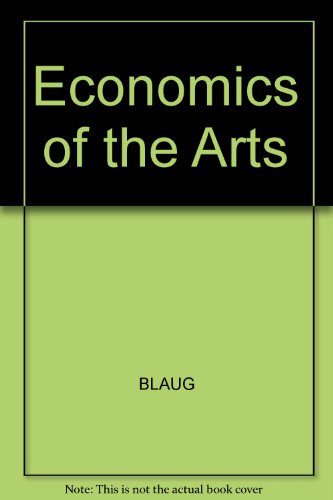
1
In the 1960s, some economists, many quite prominent in the study of traditional economics topics like economic growth or public sector economics, took an interest in the specific economic problems facing the arts. This volume, published in 1976, is a superbly chosen collection of papers from the 1960s and early 1970s that served to set cultural economics on a coherent path. It includes work on whether the arts warrant public subsidy (and if so, how public support of the arts ought to be evaluated), early empirical work on supply and demand for the arts, and the seminal work by Baumol and Bowen on what came to be known as "cost disease" in the arts, by which sectors, like the performing arts, with little chance for labor-saving technology, will persistently face cost pressures as wages generally rise across the economy. The editor, Mark Blaug, was himself one of the pioneers in the field.
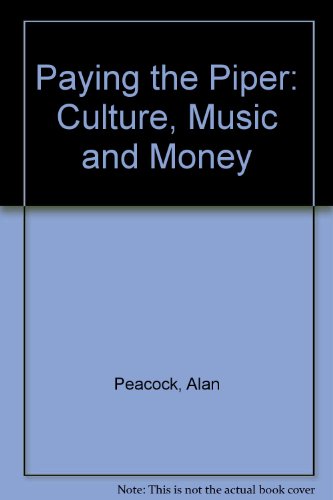
2
Alan Peacock was an academic economist as well as being a skilled musician, who served as a member of the Arts Council of Great Britain, and as Chair of the Scottish Arts Council. This memoir recounts how he tried, often in the face of opposition, to apply economic principles to arts administration and public funding, emphasizing the importance of clarifying goals, and facing squarely the problem of allocating scarce funding across competing demands. Intelligent, pragmatic, and delightfully written.
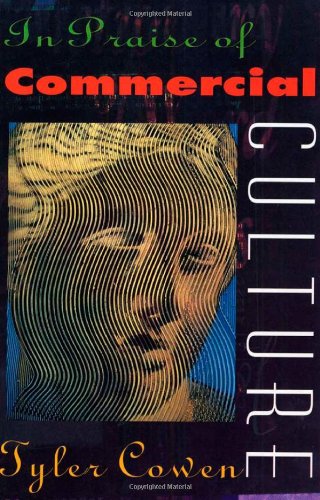
3
The title says it all: Cowen challenges the assumption that "commercial culture" - works funded, produced and sold by commercial firms with a profit-motive - is somehow of less aesthetic worth than "high" art produced with a heavy dose of public support. Markets in the arts have generated tremendous diversity, and technological change that has allowed contemporary consumers access to a fantastic range and quality of work. An especially valuable read for those who think on its face his argument must be wrong.
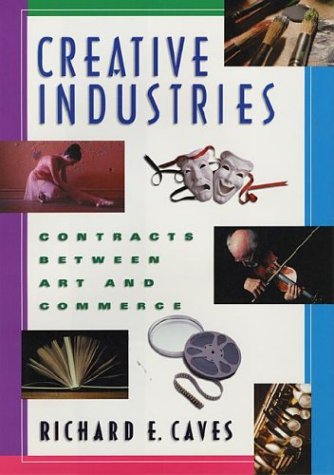
4
A comprehensive account, across all genres, of the economic organization of the arts. The arts are different from ordinary goods: there is radical uncertainty regarding how a work-in-progress will ultimately turn out, and be received by the public; creators highly value their ability to exercise their artistic freedom; the production of new works involves a high expenditure of "sunk" cost, but very low marginal cost once produced; and consumers are faced with a range of cultural options millions of times in excess of the hours in the day to sample them all. Contracts in the arts, between artists and those who bring their works to market, are structured to account for these special features. Invaluable to anyone who wants to understand the foundations of the business of the arts.
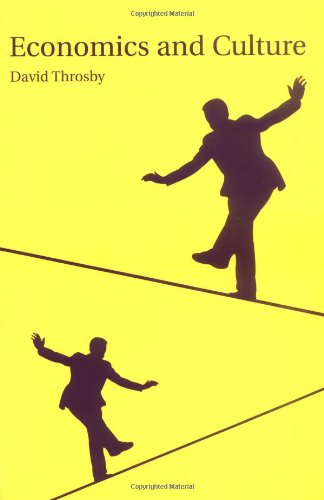
5
David Throsby is one of the pioneers in cultural economics, and this book from 2001 comes after working decades in the field. In the arts-advocacy world, one often encounters claims made for the "economic impact" of the arts, but economists as a rule are skeptical, more than most, of claims made on behalf of economics. The great strength of Economics and Culture is that Throsby, as an economist, is well aware of the limits of the discipline in being able to answer any and all questions about value in the arts.
© Five Books 2025